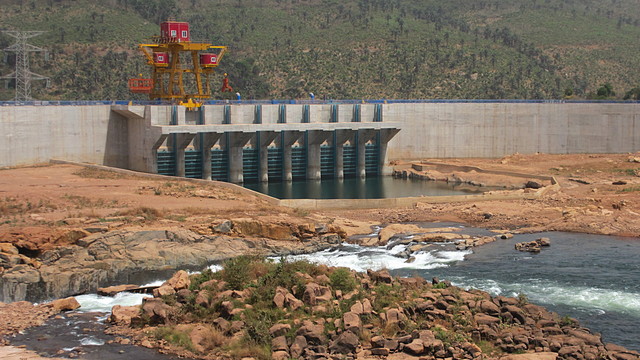ECOWAS encourages states to learn from returns on investment of large dams in West Africa
Government representatives and economists from the Economic Community of West African States (ECOWAS) are meeting in Burkina Faso to review the economic impacts of large dams.

Women walking along Sélingué dam in Mali, June 2014. (Photo: Lucile Robinson/GWI West Africa)
Large dams in West Africa will be under rare scrutiny as government representatives and economic experts from the 15 states of the Economic Community of West African States (ECOWAS) meet in Ouagadougou, Burkina Faso, on 25 and 26 March to share findings and experience from economic evaluations of existing dams.
Civil society representatives, including farmer organisations, will also take an active part in the discussions to ensure that the experiences of rural populations who live and work around the dams are taken into account.
Largely taxpayer-funded, large dams cost hundreds of millions of dollars, yet their economic impacts and value are rarely evaluated, partly due to the scope and complexities involved in carrying out such assessments. As a result, the question of whether large dams have achieved their economic goals, or who they benefit most, all too often remains unanswered.
Implementing the ECOWAS guidelines on developing water infrastructure
In April 2014, ECOWAS member states approved a draft directive for the development of large-scale water infrastructure in the region, which would be binding when adopted. The guidelines for developing water infrastructure in West Africa (French language PDF) state that large dams should be fully evaluated at least every 10 years. Such evaluations should assess their economic, social and environmental impact as well as inform decisions about future investments and policy-making for large dams.
When governments decide to invest hundreds of millions of dollars in a large dam and irrigation scheme they do so on the basis of detailed economic analyses and predicted benefits for development. At a time when many more dams are being built, it is important to ask whether the economic assumptions that lay behind such important decisions have proved correct and what the consequences have been.
Investment in large multi-purpose dams has long been at the heart of national development policies in West Africa. Governments and donors hope that these will boost environmentally sustainable energy production, improve national food security and control water flows in the face of unpredictable climate conditions.
Difference between economic returns from agricultural and hydropower components
Recent research led by GWI West Africa on the Bagré dam in Burkina Faso and the Niandouba and Confluent dams in the Anambé valley in Senegal show that the economic returns from the agricultural component of the dams have been significantly lower than expected when they were designed.
This low return on investment in the agricultural schemes around the dams studied is in part due to over-optimistic feasibility studies with yields and/or market value often proving lower than anticipated.
Additionally, lack of state investment in human resources to maintain the agricultural schemes and support the smallholder farmers who work on them has also affected production. Hydropower on the other hand seems to have been more profitable in the case of multi-purpose dams.
Wilson Ibrahim Babatundé, director of the ECOWAS Water Resources Coordination Centre (WRCC), said: "There are clearly differences in economic rates of return between hydropower and irrigation components. This workshop will provide a valuable opportunity for experts from across the region to come together to share much-needed experience and tools for evaluating the economic impact of large dams. Our guidelines recommend this approach, supporting good infrastructure planning across the region.”
The workshop is organised by the ECOWAS Water Resources Coordination Centre with support from the Global Water Initiative (GWI) in West Africa and with UK aid from the UK government. GWI is implemented by IIED and IUCN and funded by the Howard G. Buffett Foundation. This is the third in a series of annual workshops organised by GWI West Africa to support the ECOWAS dialogue on large scale water infrastructure.



